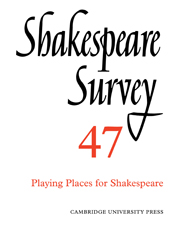Book contents
- Frontmatter
- Shakespeare Played Small: Three Speculations about the Body
- The Architecture of the Fortune Playhouse
- The Bare Island
- ‘How Chances it they Travel?’ Provincial Touring, Playing Places, and the King’s Men
- Writing for the Metropolis: Illegitimate Performances of Shakespeare in Early Nineteenth-Century London
- The Perishable Body of the Unpoetic: A. C. Bradley Performs Othello
- Playing Places for Shakespeare: The Maddermarket Theatre, Norwich
- ‘A Fairly Average Sort of Place’: Shakespeare in Northampton, 1927–1987
- The Living Monument: Self and Stage in the Criticism and Scholarship of M. C. Bradbrook
- Stratford Stages: Interviews with Michael Reardon and Tim Furby, and Sam Mendes
- Dis-Covering the Female Body: Erotic Exploration in Elizabethan Poetry
- Theseus’ Shadows in A Midsummer Night’s Dream
- ‘Time for Such a Word’: Verbal Echoing in Macbeth
- Shakespeare’s Knowledge of Italian
- Tamburline and Edward Alleyn’s Ring
- Shakespeare Performances in England, 1992–1993
- Professional Shakespeare Productions in the British Isles, January-December 1992
- The Year's Contributions to Shakespeare Studies 1 Critical Studies
- 2 Shakespeare’s Life, Times, and Stage
- 3 Editions and Textual Studies
- Books Received
- Index
‘A Fairly Average Sort of Place’: Shakespeare in Northampton, 1927–1987
Published online by Cambridge University Press: 28 March 2007
- Frontmatter
- Shakespeare Played Small: Three Speculations about the Body
- The Architecture of the Fortune Playhouse
- The Bare Island
- ‘How Chances it they Travel?’ Provincial Touring, Playing Places, and the King’s Men
- Writing for the Metropolis: Illegitimate Performances of Shakespeare in Early Nineteenth-Century London
- The Perishable Body of the Unpoetic: A. C. Bradley Performs Othello
- Playing Places for Shakespeare: The Maddermarket Theatre, Norwich
- ‘A Fairly Average Sort of Place’: Shakespeare in Northampton, 1927–1987
- The Living Monument: Self and Stage in the Criticism and Scholarship of M. C. Bradbrook
- Stratford Stages: Interviews with Michael Reardon and Tim Furby, and Sam Mendes
- Dis-Covering the Female Body: Erotic Exploration in Elizabethan Poetry
- Theseus’ Shadows in A Midsummer Night’s Dream
- ‘Time for Such a Word’: Verbal Echoing in Macbeth
- Shakespeare’s Knowledge of Italian
- Tamburline and Edward Alleyn’s Ring
- Shakespeare Performances in England, 1992–1993
- Professional Shakespeare Productions in the British Isles, January-December 1992
- The Year's Contributions to Shakespeare Studies 1 Critical Studies
- 2 Shakespeare’s Life, Times, and Stage
- 3 Editions and Textual Studies
- Books Received
- Index
Summary
The Globe, Covent Garden, Drury Lane, the Lyceum, Her Majesty’s, the Old Vic, the Shakespeare Memorial Theatre, the National Theatre – these are the theatres which resonate through the annals of theatre history, the places where actors – and latterly directors – have sought the stamp of contemporary acclaim and a passport to immortality. But for Shakespeare’s plays there has always been ‘a world elsewhere’: the stock companies, the London ‘minor’ theatres, the touring circuit and the repertory theatres. Quantitatively these alternative places have outstripped the patent and national theatres in their output of Shakespeare; qualitatively they have achieved standards at least high enough to sustain Shakespeare in their repertoires, but, with rare exceptions, their work has been overlooked. No doubt this is partly because of the relatively scant records available – no lengthy reviews in the national press, few memoirs by or biographies of the performers, little memorabilia beyond programmes, rarely a promptbook or stage design, only occasional glimpses through the photographer’s lens. And yet the endeavours of these Shakespearians are worthy of attention; indeed to echo Linda Loman, in Arthur Miller’s Death of a Salesman, ‘attention must be paid’.
In no sphere is this truer than the repertory movement, which from Miss Horniman's pioneering work at the Gaiety Theatre, Manchester (1908), transformed the nature of the nation's theatre outside London and remains its foundation to this day. Shakespeare's plays were always fundamental to repertory, but, Barry Jackson at the Birmingham Rep apart, attention has not been paid to their achievements.
- Type
- Chapter
- Information
- Shakespeare Survey , pp. 91 - 106Publisher: Cambridge University PressPrint publication year: 1994



